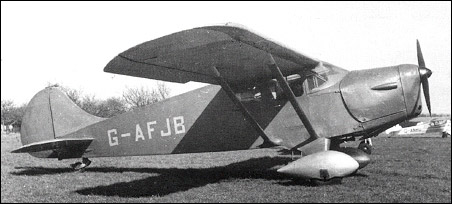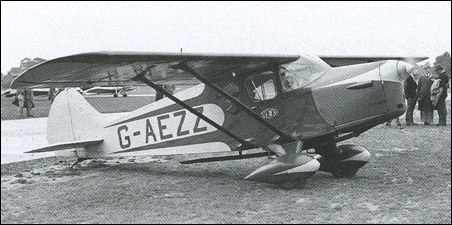|
| Cheap and efficient aircraft were the hallmark of
Australian aircraft designer Geoffrey N. Wikner, who
achieved a measure of success in his own country
with his Wicko and Wicko Lion sports monoplanes,
before setting up in Britain. Joining with V. Foster
and J. F. Lusty, he formed the Foster Wikner Aircraft Co Ltd, operating from Lusty's furniture
factory at Bromley-by-Bow, East London. The first
prototype two-seat Wicko FW1, with a modified Ford
V8 engine known as the Wicko F, was completed in
September 1936, but was later re-engined with a 90hp
Cirrus Minor I as the FW2. A 150hp Cirrus Major
installation, specifically for the 1937 King's Cup race,
resulted in the FW3, and this engine became the standard
powerplant for all GMI production models. The
company was by then established at Southampton
Airport, Eastleigh, but ceased production at the
outbreak of war.
| Barry, 22.06.2016 14:00 The one and only Wicko is the GM 1, last of the ten produced
Crew 2
Power plant 1 x 130 h.p De Havilland Gypsy Major inverted
4 cylinder air cooled engine
Span 31'6" Length 23'3" Height 6'7" Wing area 153 sq ft
Empty weight 1,255 lb Gross weight 2,000 lb
Max speed 140 mph Cruising speed 120 mph Range 480 miles
Service ceiling 20,000 ft reply | | Doug Partington, e-mail, 23.12.2013 10:36 I own the Geoff Wikner built racing car the Wikner Ford special regarded as the oldest Australian built racing car. I have owned it 55 years, and this year it was inducted into the Model T Ford Club of America hall of fame. A beautiful recreation of Wikners first aircraft the Wicko Cabin Sport is in the Queensland Air Museum at Caloundra. It was built by the late Ed Foster from original Wikner drawn plans. I have seen Joe Dibbles Wicko War Ferry, it's beautiful. My car is on the Wicko web site reply | | marcel seguin, e-mail, 22.06.2013 20:50 I recall building a model airplane called the wicko wiszard. reply | | hualunjia, 18.06.2011 11:29 G N Wikner designer and builder of the Wicko flew with the Air Transport Auxilary during the war surviving two almost fatal crashes while flying 67 different types reply | |
| | Alan Eley, e-mail, 18.01.2011 20:04 I believe the ATA pilot Lettice Curtis owned a Wicko post-war. Which of the 10 Wickos built was that (possibly G-AFJB ?)
She was an intrepid flyer, racing Spitfire XI PL983 in three or more King's Cup air races. When was that ? reply | | Richard Bailey, e-mail, 19.10.2010 10:46 Correction to Barry's entry.
The survivor is G - AFJB. It has been totally rebuilt and won a coveted prize at Goodwood. I flew in it in 1960 when it belonged to a scgholl friend's father in Yorkshire UK. reply | | Barry, 22.01.2010 17:31 There is just one Wicko surviving G-AJFP which has recently been restored. I recommend everyone to visit the "Wicko" website mentioned below. reply | | E Lundskog, e-mail, 01.03.2009 12:48 Being the webmaster of the only left, newly restored Wicko I would recomend to go visit the web site.
www.wicko.com reply | | William Newling, e-mail, 12.12.2008 06:05 Captain Wikner Early Bird Aviator, in 1946 flew a Halifax bomber to Australia with 21 crew and passengers
His biography entitled FlightOf The Halifax available from me. reply | | William Newling, e-mail, 12.12.2008 05:41 Captain G N Wikner designer and builder of the Wicko flew with the Air Transport Auxilary during the war surviving two almost fatal crashes while flying 67 different types reply |
|
Do you have any comments?
|
| 
COMPANY
PROFILE
All the World's Rotorcraft
|







